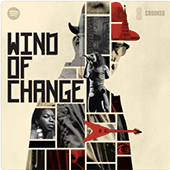The best podcasts of 2020 so far

There’s no real discussion of the year’s best podcasts so far without addressing the apocalyptic elephant in the room: Many series were compelled to pivot their content to coronavirus-related storytelling beginning in March, while others bent over backwards to explain themselves as they released non-COVID-related episodes they had obviously batch-recorded weeks earlier. Right around now is when everyone seems to be hitting their pandemic groove, however—or at least, audiences have largely adjusted to hearing the tinny sound quality and halting cadence of hosts recording remotely from their laptops. Suffice it to say, it’s been a uniquely challenging time for content creators (as it has been for us all), and either in spite of or because of it, they’ve managed to find new ways to move us, and keep us moving. Here are some of the best series from the first half of 2020.
Most Significant Correction To The Record
Floodlines
Hurricane Katrina and its aftermath are 15 years removed from the national psyche, so an eight-part series—dropping amid larger, fresher crises—might appear to be an old recitation of a well-known event. But the unfolding narrative reveals a sweeping story that has never been told in its entirety. Journalist Vann R. Newkirk II presents vivid evidence that the real disaster was not a force of nature; it was human, and victims of Katrina are still suffering in want of recognition. Interview segments portray the disaster in vivid detail, revealing heartbreak, desperation, and at times resilience and joy. Newkirk’s analysis shows American citizens placed too much faith in their institutions and were failed by them at nearly every level. The New Orleans police department, the federal government (typified by FEMA and its leader Michael Brown, who sits for a six-hour interview), and the Army Corps of Engineers are all implicated here. And through it all, the national media was there to get the story wrong, demonizing Black looters, spreading rumors about phantom snipers, and blaming residents for choosing to live in a supposedly undefendable location. People have waited a long time for this acknowledgment. [Zach Brooke]
Best Team-Up
Double Threat
In the midst of a truly terrible year, podcasting giants Tom Scharpling and Julie Klausner have finally teamed up to remind listeners that despite all the horrible things going on, there are still plenty of other horrible things to laugh at. Double Threat sees Scharpling and Klausner harnessing their comedic chemistry to rip apart all the creeps and overpaid mediocrities that pollute the media landscape. On a recent episode, the duo hate-listened to Alec Baldwin’s insensitive interview with Woody Allen on NPR. While rolling their eyes at all the bullshit and evasions coming thick and fast from both men, Tom and Julie make time for digressions about Allen’s career as a Batman villain writing riddles for the Riddler alongside Neil Simon. These extended riffs, where pop culture figures are smashed together, have led listeners down some truly strange roads, including a startling revelation from Scharpling: As a child he believed that the concentric circles that Porky Pig pops out of to deliver his signature catchphrase was the inside of a carrot. Klausner’s delight at this information makes it clear that, more than anything else, Double Threat is about two funny friends trying to keep each other sane. [Anthony D Herrera]
Best Apocalypse Guidebook
How To Survive The End Of The World
Octavia Butler and the Brown sisters have been saying it for a long time: Get ready, stay ready. How To Survive The End Of The World has created a thoughtful, comprehensive miniseries in 2020 on how to survive the apocalypse. Organizer and theologian Autumn Brown normally hosts this social justice podcast with her sister, adrienne maree brown, but takes the lead on this run of episodes. This grounding and practical audio handbook asks, what skills do we have, and what skills do we need, to survive during a systemic collapse? Each episode focuses on a single skill and features anecdotes, instructions, and energizing conversations with experts on the topic as well as sweet listener messages, sharing how they create intimacy during this disconnected time. If it feels overwhelming to build such a robust skill set, don’t worry—the prescient series provides ideas that are actionable and (thank god) playful. If you want to learn how to stay well during the outbreak, create a small garden in your kitchen, or get the skills to better love other people and the world we share, How To Survive The End Of The World has crafted you a bible. [Morgan McNaught]
Most Welcome Change To The Investigative Podcast Genre
Wind Of Change
In the years since the podcast boom, there has been a trend in the medium toward the macabre—investigative shows all seem to be fixated on murder and the darker elements of humanity. Wind Of Change lives up to its name, however, shaking up the genre by following a tale of the unlikely intersection between international espionage and ’80s hair metal. Specifically, the show attempts to unpack the rumor that the CIA wrote the West German band the Scorpions’ 1989 megahit “Wind Of Change” as a sort of anti-Soviet psyop. Investigative podcasts are rarely this ebullient and introspective about the implications of the story they’re telling. While the program isn’t a direct product of the magazine, the New Yorker’s distinct journalistic voice is present throughout all eight engrossing episodes, and the podcast is all the better for it. This comes down to Patrick Radden Keefe, a staff writer for The New Yorker, who imbues the podcast with the magazine’s signature globetrotting expansiveness (Russia, Ukraine, Germany), as well as some narrative detours that only help to enrich the experience. Keefe mines a surprising amount of depth from this lark. [Ben Cannon]